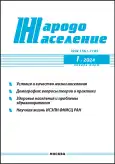Ethnic diversity and economic diversification: the case of Russian regions
- Authors: Rozhina E.A.1, Vasilyeva R.I.1
-
Affiliations:
- Institute of Economics of the Ural Branch RAS
- Issue: Vol 27, No 1 (2024)
- Pages: 82-94
- Section: DEMOGRAHFY: THEORY AND PRACTICE ISSUES
- URL: https://journal-vniispk.ru/1561-7785/article/view/272768
- DOI: https://doi.org/10.24412/1561–7785–2024–1–82–94
- EDN: https://elibrary.ru/LJNPYB
- ID: 272768
Cite item
Full Text
Abstract
About the authors
Ekaterina A. Rozhina
Institute of Economics of the Ural Branch RAS
Email: rozhina.ea@uiec.ru
ORCID iD: 0000-0003-4543-6265
Junior Researcher Ekaterinburg, Russia
Rogneda I. Vasilyeva
Institute of Economics of the Ural Branch RAS
Email: vasilyeva.ri@uiec.ru
ORCID iD: 0000-0001-5539-3145
Junior Researcher Ekaterinburg, Russia
References
- Berthélemy, J. C. Commerce international et diversification économique / J. C. Berthélemy // Revue d’économie politique. — 2005. — Vol. 115 — No. 5. — P. 591–611. doi: 10.3917/redp.155.0591
- Albassam, B. A. Economic diversification in Saudi Arabia: Myth or reality? / B. A. Albassam // Resources Policy. — 2015. — Vol. 44. — P. 112–117. doi: 10.1016/j.resourpol.2015.02.005
- Esanov, A. Economic diversification: dynamics, determinants and policy implications / A. Esanov // Revenue Watch Institute. — 2012. — Vol. 8. — P. 1–26.
- Gören, E. How ethnic diversity affects economic growth / E. Gören // World Development. — 2014. — Vol. 59. — P. 275–297.
- Alesina, A. Ethnic diversity and economic performance / A. Alesina, E. La Ferrara // Journal of economic literature. — 2005. — Vol. 43. — No. 3. — P. 762–800.
- Montalvo, J. G. Ethnic diversity and economic development / J. G. Montalvo, M. Reynal-Querol // Journal of Development economics. — 2005. — Vol. 76. — No. 2. — P. 293–323.
- Zaretskaya, V. G. Economic diversification in the post-soviet states / V. G. Zaretskaya // Innovation Management and Education Excellence through Vision 2020: Proceedings of the 31st International Business Information Management Association Conference (IBIMA). — Milan, 2018. — P. 2667–2672.
- Jolo, A. M. Driving Factors of Economic Diversification in Resource-Rich Countries via Panel Data Evidence / A. M. Jolo, I. Ari, M. Koç // Sustainability. — 2022. — Vol. 14. — No. 5. — P. 2797. doi: 10.3390/su14052797
- Muhamad, G. M. How to reduce the degree of dependency on natural resources? / G. M. Muhamad, A. Heshmati, N. T. Khayyat // Resources Policy. — 2022. — Vol. 72. — P. 102047. doi: 10.1016/j.resourpol.2021.102047
- Lebdioui, A. A. Economic Diversification and Development in Resource-dependent Economies: Lessons from Chile and Malaysia / A. A. Lebdioui. — Cambridge : University of Cambridge, 2019. — 361 р.
- Easterly, W. Africa’s growth tragedy: policies and ethnic divisions / W. Easterly, R. Levine // The Quarterly Journal of Economics. — 1997. — Vol. 112. — No 4. — P. 1203–1250. doi: 10.1162/003355300555466
- Dincer, O. C. Ethnic diversity and economic growth in China / O. C. Dincer, F. Wang // Journal of Economic Policy Reform. — 2011. — Vol. 14. — No. 1. — P. 1–10. doi: 10.1080/17487870.2011.523985
- Churchill, S. A. Income and Ethnic Fractionalisation: Evidence from British Microdata / S. A. Churchill // Economic Issues. — 2019. — Vol. 24. — No. 1. — P. 21–34.
- Montalvo, J. G. Ethnic diversity and economic development / J. G. Montalvo, M. Reynal-Querol // Journal of Development Economics. — 2005. — Vol. 76. — No. 2. — P. 293–323. doi: 10.1016/j.jdeveco.2004.01.002
- La Porta, R. The quality of government / R. La Porta, F. Lopez-de-Silanes, A. Shleifer, R. Vishny. The quality of government // The Journal of Law, Economics, and Organization. — 1999. — Vol. 15. — No. 1.— P. 222–279. doi: 10.1093/jleo/15.1.222
- Collier, P. Ethnic Diversity: an Economic Analysis / P. Collier // Economic Policy. — 2001. — Vol. 32. — No. 16. — P. 128–166.
- Collier, P. Ethnicity, politics and economic performance / P. Collier // Economics & Politics. — 2000. — Vol. 12. — No. 3. — P. 225–245. doi: 10.1111/1468–0343.00076
- Bluedorn, J. C. Can democracy help? Growth and ethnic divisions / J. C. Bluedorn // Economics Letters. — 2001. — Vol. 70. — No.1. — P. 121–126. doi: 10.1016/S0165–1765(00)00345–1
- Limonov, L. Regional cultural diversity in Russia: does it matter for regional economic performance? / L. Limonov, M. Nesena // Area Development and Policy. — 2016. — Vol. 1. — No. 1. — P. 63–93. doi: 10.1080/23792949.2016.1164016
- Dinku, Y. Ethnic Diversity and Local Economies / Y. Dinku, D. Regasa // South African Journal of Economics. — 2021. — Vol. 89. — No. 3. — P. 348–367. doi: 10.1111/saje.12286
- Несена, М. В. Влияние культурного разнообразия регионов России на экономические показатели / М. В. Несена // Общественные науки и современность. — 2015. — № 5. — С. 72–85. EDN: UTEWXL
- Boudreaux, C. J. Ethnic diversity and small business venturing / C. J. Boudreaux // Small Business Economics. — 2020. — Vol. 54. — No. 1. — P. 25–41. doi: 10.1007/s11187–018–0087–4
- Bufetova, A. N. Cultural heterogeneity and economic development in Russia / A. N. Bufetova, A. A. Khrzhanovskaya, E. A. Kolomak // Journal of Siberian Federal University. — 2020. — Vol. 13. — No. 4. — P. 453–463. doi: 10.17516/1997–1370–0582
- Васильева, Р. И. Показатели экономической и экспортной диверсификации в регионах Российской Федерации за 2000–2021 гг.: база данных / Р. И. Васильева, В. А. Войтенков, Е. А. Рожина, А. Р. Уразбаева. — Свидетельство о государственной регистрации базы данных № 2023621916 от 09.06.2023. EDN: TXGZRD
- Alesina, A. Fractionalization. / A. Alesina, A. Devleeschauwer, W. Easterly, S. Kurlat, R. Wacziarg // Journal of Economic Growth. — 2003. — Vol. 8. — P. 155–194. doi: 10.1023/A:1024471506938
- Gören, E. How ethnic diversity affects economic development / E. Gören // ZenTra Working Paper in Transnational Studies. — 2013. — No. 14. — URL: https://papers.ssrn.com/sol3/papers.cfm?abstract_id=2254008 (дата обращения: 17.12.2022). doi: 10.2139/ssrn.2254008
- Machado, J. A. Quantiles via Moments / J. A. Machado, J. C. Santos Silva // Journal of Econometrics. — 2019. — Vol. 213. — No. 1. — P. 145–173. doi: 10.1016/j.jeconom.2019.04.009
Supplementary files










